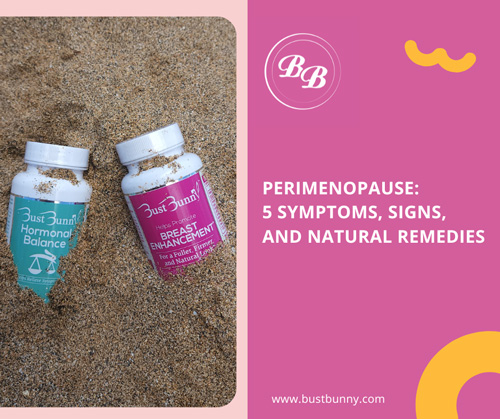Limited time offer!
JULY SALE, use code "JULY10" to get 10% OFF
Perimenopause, or menopausal transition, refers to the time period leading up to menopause. It’s when your body naturally transitions into menopause, which marks the end of your reproductive years. During perimenopause, you’re likely to experience various psychological, physical, and social changes.

For instance, in early perimenopause, you’re likely to experience high estrogen-associated symptoms, such as:
Late perimenopausal symptoms may include:
No matter what you’re going through, there are steps you can take to ease your symptoms, such as:
Here’s an in-depth look at the signs and symptoms of perimenopause.

During perimenopause, your ovaries may start to run out of eggs and wind down, causing fluctuations in the female hormones progesterone and estrogen. This can affect your period and ovulation.
Your menses may become irregular, lighter, heavier, shorter, or longer. In some months your period may not come at all and in others, you may ovulate twice in a cycle.
You may also experience spotting—either between periods or after sexual intimacy.
In a nutshell, perimenopause is often first characterized by changes in your menstrual cycle or irregular periods due to the fluctuation of hormones.
Frequent hot flashes and night sweats occur when your brain is unable to regulate your internal temperature. This is a common physical response to having less estrogen.
Hot flashes can come on suddenly and at any time of day. They’re characterized by:
The frequency of hot flashes varies widely. Some women experience this symptom several times a day and during the night. Others may only experience hot flashes a few times a week.
Hot flashes that occur at night, also known as night sweats, can reduce sleep quality. Although some women may feel slightly warm, others wake up drenched in sweat, making it difficult to fall back asleep. Night sweats can also interfere with your partner’s quality of sleep.
Having said that, hormone balancing supplements or hormone replacement therapy are most often used to reduce the intensity and severity of hot flashes and night sweats. They work by restoring the natural balance of hormones in your body.
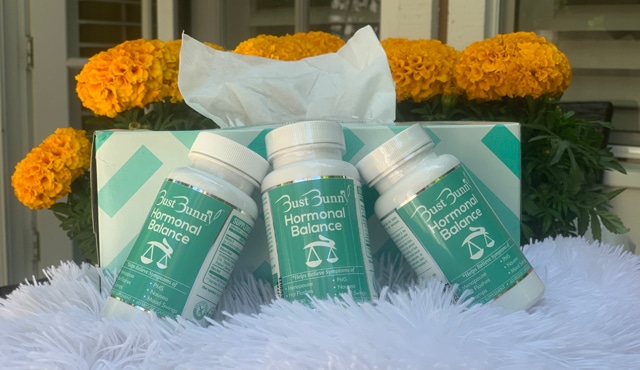
Many women experience stronger mood swings during perimenopause because of hormonal fluctuations at play. These mood changes may be characterized by:
You may also experience disruptions at work and home due to these mood changes.
You’re also more likely to experience rapid mood changes if you’ve had postnatal depression or severe premenstrual syndrome (PMS) in the past.
Those who haven’t struggled with PMS in the past may find that they now do because of the body’s enhanced sensitivity to hormone fluctuations during this time. Most women find relief from hormone replacement therapy and hormonal balance supplements, which help to:
During perimenopause, you can suffer from both vaginal and urinary problems. For example, low estrogen levels can make the tissues of your vulva and the lining of your vagina:
This condition is referred to as vulvovaginal atrophy. The decrease in estrogen also reduces vaginal secretions, resulting in decreased lubrication.
Additionally, your vagina becomes less elastic or flexible as you enter perimenopause. As a result, tampon use, sexual intercourse, and smear tests may become extremely uncomfortable.
When your body has less estrogen, the lining of your bladder may also become thin. You may feel the need to urinate more frequently and desperately as a result. You’ll also be more likely to suffer from recurrent urinary tract infections.
Brain fog is another common symptom of perimenopause that occurs due to a mix of hormonal shifts and everyday stressors.
During perimenopause, your ovaries tend to slow down the process of ovulation. This causes estrogen to rise and fall at uneven rates. The fluctuating estrogen levels can cause brain fog or memory loss.
Brain fog is an umbrella term defined by:
For example, you may forget appointments, words, or why you walked into a room.
However, no matter what perimenopause symptoms you have, there are ways to ease them. We’ll now explore some natural remedies you can use to cope with perimenopause.
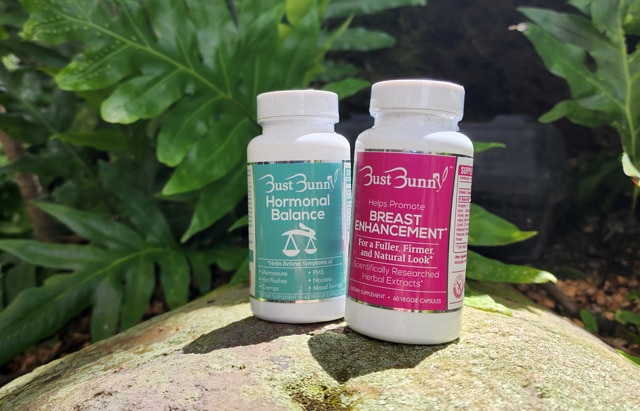
As you progress through perimenopause, the following natural remedies can ease some symptoms and promote overall health:
Black cohosh is a perennial herb that has been used in traditional medicine for many years, especially in supporting women’s health. Black cohosh has an estrogenic-like effect that helps women balance their hormones.
It’s often used to relieve the following symptoms:
Also, comparisons between black cohosh, hormone replacement therapy (HRT) and placebos concluded that black cohosh is a safe and effective alternative to HRT.
With this in mind, you can ease your symptoms by adding liquid or powdered black cohosh to your food, smoothies, juices, or by taking it as a dietary supplement.
Black cohosh is often combined with other herbs to tailor a formula for easing perimenopausal and menopausal symptoms.
For example, it’s one of the ingredients in Bust Bunny’s Hormonal Balance supplement. You can reap the benefits of Bust Bunny’s Hormonal Balance supplement by taking two capsules every day.
Other names for black cohosh include:
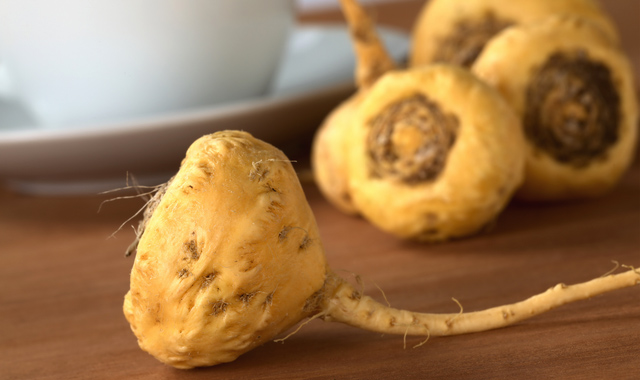
Maca root, or Peruvian ginseng, is an edible mountain plant that’s part of the cruciferous family. Owing to its plant sterol content, maca allows perimenopausal women to maintain hormonal balance by stimulating their endocrine system.
In other words, maca root aids your body in producing more estrogen if your levels are too low. This effect is important because low estrogen levels lead to unpleasant symptoms such as hot flashes, vaginal dryness, and mood swings, among others.
In light of this fact, maca root may benefit women going through the menopausal transition in the following ways:
Adding a serving of maca root powder to your lattes, smoothies, or meals can help you experience all of the benefits listed above.
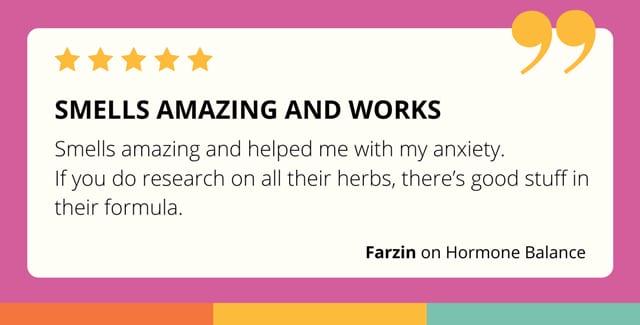
Alternatively, you can take maca root in capsule form. It’s also an ingredient in Bust Bunny’s Hormonal Balance supplement. Bust Bunny recommends taking 2 capsules per day for maximum benefits.
Other ingredients in Bust Bunny’s Hormonal Balance supplement are listed in the table below, along with their uses:
| Ingredient | What It Helps With |
|
Shatavari |
|
|
Red clover |
|
|
Dong Quai |
|
|
Ginger root |
|
|
Ashwagandha powder |
|
|
Chamomile |
|
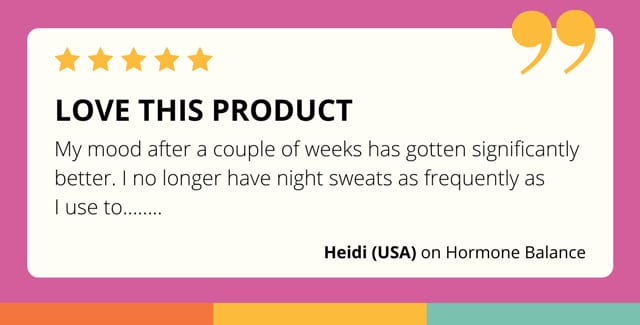
Walking, running, swimming, and weight lifting are good ways to cope with the emotional and physical effects of perimenopause.
Since more active people tend to be leaner than sedentary individuals, middleaged women who are active have an advantage as they enter the menopausal transition because they have:
In other words, regular physical activity guards you against perimenopausal symptoms like excessive weight gain and obesity.

Research has also shown that participating in moderate-intensity aerobic exercise, such as brisk walking, cycling, ballroom dancing, or water aerobics, at least 3 times per week for 12 weeks can lead to improvements in:
However, it’s important to avoid exercising too close to bedtime, as this can make it harder for you to sleep.
Expert Tip: Moderate-intensity exercise won’t disrupt your sleep if you stop at least 90 minutes before bedtime.
Other benefits of sticking with moderate regular exercise or a strength training program are:
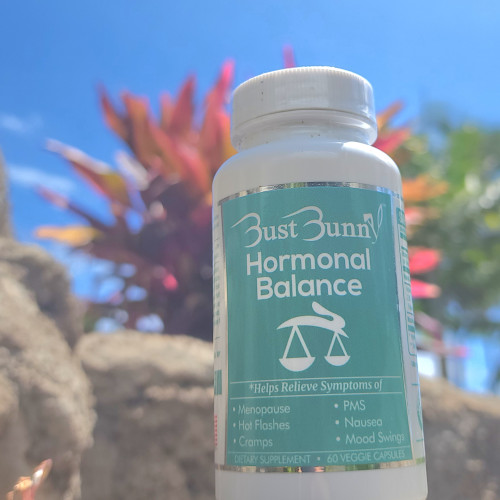
Yoga exercises (asanas), breathing techniques, and mindful meditation are effective ways of managing:
Even so, there are many different types of yoga, and you’ll need to find the right one to address the symptoms you’re experiencing. For example, while restorative yoga can help you relax and ease hot flashes and anxiety, it won’t strengthen your bones and muscles.
The best results can be achieved through a combination of gentle vinyasa, flow, yin, and restorative yoga poses, along with meditation and breathing exercises.
These gentle and mindful movements help to calm your mind, keep you grounded, connect you with your body, and promote an overall sense of well-being.
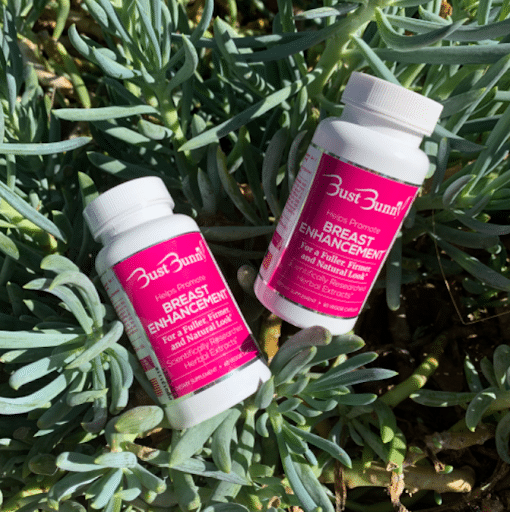
It’s also common for breasts to get bigger, smaller, or saggier at this time due to hormonal fluctuations involved in perimenopause. For most women, they tend to get smaller.
If you’re in a similar situation, then Bust Bunny Breast Enhancement Supplements are designed to help you develop perkier and firmer breasts.
These natural supplements are made from all-natural ingredients that have helped enhance breast size since 1999.
Share on Instagram:
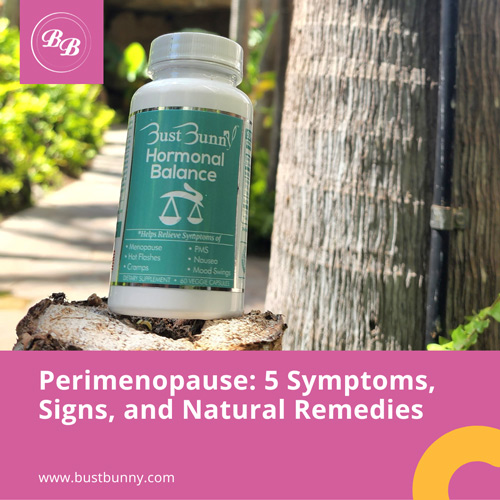
Share on Facebook:
